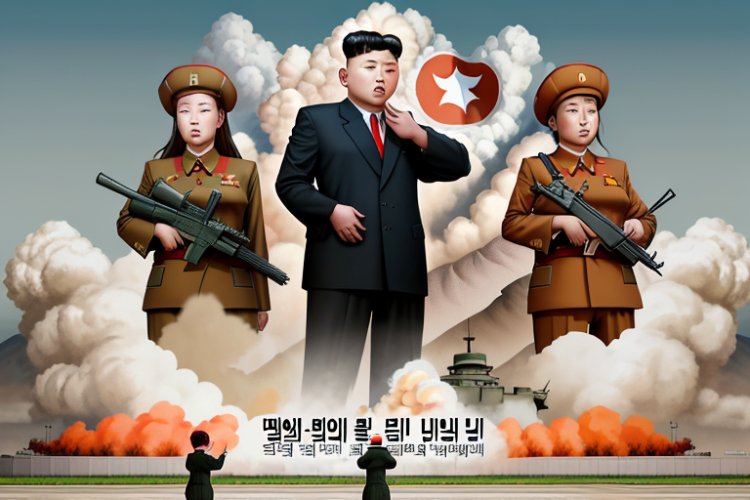Unravelling the Truth: The Dark Shadows of North Korea
An in-depth exploration of human rights abuses in North Korea through accounts from defectors, historical contexts, and analyses of state systems aimed at oppression and control.

The Kim Dynasty: A Historical Perspective of Oppression
Darkness surrounds North Korea, a mysterious country under the rule of an oppressive dictatorship well known for its tyranny and oppression. The Kim Dynasty, which has held power since 1948, has cast a long shadow over the land. This chapter aims to provide a historical perspective on the oppressive rule of the Kim Dynasty in North Korea.
The roots of the Kim Dynasty can be traced back to the establishment of the People's Republic of Korea under Kim Ilung. However, instead of democracy flourishing, dissent was stifled, and state control took precedence. The Korean War further exacerbated repression and set the stage for ongoing human rights violations in the country.
The songbun system, which classifies citizens according to their allegiance to the regime, is one of the oppressive tools used by the Kim Dynasty. This system not only controls political dissidents but also punishes future generations labelled as enemies of the state. This cruel practice has instilled fear and submission among the North Korean people.
As globalisation swept through other nations, North Korea isolated itself from the world. The regime imposed strict information control, limiting access to outside news and suppressing any attempts to seek knowledge beyond state-sanctioned narratives. This isolation further reinforced the oppressive rule of the Kim Dynasty.
Testimonies from defectors like Kang Chal Juan bring to light unbearable conditions and mistreatment in North Korean gulags. These gulags, such as Camp 22 and Horong, are places of unimaginable horror and suffering where prisoners endure forced labour, torture, and abysmal living conditions. The harrowing stories shared by defectors expose the sheer brutality of life under the Kim Dynasty.
Despite decades of darkness, moments of resistance and hope emerge. The attempted uprising at Camp 18 exemplifies the indomitable spirit of North Koreans who yearn for freedom and justice. These sparks remind us that even in the face of oppression, the human spirit can prevail.
In the next chapter, we will delve deeper into the horrors and hopes through the eyes of defectors who have bravely escaped the clutches of the Kim Dynasty.
Life Inside the Gulags: Horrors and Hope Through Defectors' Eyes
The following chapter ventures into the harrowing experiences of North Korean defectors who have managed to escape the treacherous confines of the country's gulags. Their accounts shed light on unimaginable horrors endured and reveal glimpses of hope that provided them with the strength to survive.
Shin Dong-hyuk stands as one prominent defector whose powerful testimony has captivated international attention. Born and raised in Camp 14, one of North Korea's most notorious prisons, he witnessed executions, endured torture, and lived in perpetual fear. His escape and subsequent efforts to raise awareness have provided invaluable insights into the darkness of these gulags.
Stories from defectors like Shin provide a window into a society where systematic abuse, forced labour, and appalling living conditions are the norm. These prison camps, hidden away from prying eyes, make it challenging to obtain firsthand information. However, through brave individuals like Shin, we gain insight into the daily struggles faced by prisoners.
Despite grim realities, defiant acts and resilience emerge within these camps. The attempted uprising at Camp 18 showcased prisoners' determination to fight for their freedom. Though ultimately unsuccessful, this act of resistance displays an unyielding spirit among those trapped in the gulags.
Through defectors' accounts, we also gain understanding about Quan Liso—political prison camps—and their role in perpetuating human rights abuses in North Korea. Limited glimpses provided by satellite imagery and testimonials unveil the scale and severity of violations occurring within these walls.
Public executions form another horrifying aspect of life in North Korean prisons. They serve as tools of control, instilling fear and retribution among enemies of the state and ordinary citizens alike. Executions often take place in symbolic locations and are publicly witnessed, blurring the line between reality and performance.
Defectors' testimonies and covert recordings expose the gruesome reality of public executions in North Korea. These accounts offer concrete evidence of the regime's brutality and its disregard for human life.
Despite the immense hardships faced by prisoners, glimmers of hope and resilience persist. Many defectors risk their lives to escape the gulags and seek freedom. Their stories of survival, courage, and determination stand as reminders that even in the darkest times, hope can flourish.
In the following section, we will examine state control over religion and restrictions placed on people's faith and spirituality as another tool of the North Korean regime.
State Control Instruments: Public Executions, Forced Labour, and Restricted Religion
The subsequent chapter delves into the instruments employed by the North Korean regime to maintain control, focusing on public executions, forced labour, and religious restrictions.
Public executions serve as a form of punishment and control in North Korea. These grim spectacles eliminate perceived threats to the state while instilling fear among its populace. Executions take place in symbolic locations in front of both state enemies and regular citizens, blurring reality with theatricality.
Defectors' testimonies and clandestine recordings unveil the grotesque reality of public executions in North Korea. These accounts, obtained through covert means, provide tangible evidence of the regime's brutality and its callousness towards human life. Arbitrary nature characterises these executions, targeting both political dissidents and individuals accused of minor offences, perpetuating an environment of fear and oppression.
Forced labour constitutes another tool used by the regime to maintain its grip on power. It has become a significant export for North Korea, with workers subjected to harsh conditions both domestically in gulags and abroad. Strict monitoring ensures compliance, while a portion of earnings is syphoned back to finance the regime's ambitions.
Defectors' testimonies shed light on the gruelling conditions faced by those trapped in forced abortion. Prolonged hours, meagre pay, and inhumane treatment are their daily realities. The regime's exploitation of its own people for economic gain further exemplifies its oppressive nature and disregard for fundamental human rights.
Yet another area that the regime strictly controls is religion. While the country's constitution theoretically guarantees religious freedom, the state imposes severe consequences on those practicing religion outside of state-sanctioned venues.
Christianity faces intense suppression within North Korea, with secret congregations and covert prayer meetings risking punishment. Buddhism, once a vibrant spiritual tradition, has also been restricted, with temples transformed into tourist attractions rather than authentic centres of spirituality. The regime's efforts to control and restrict religious beliefs highlight its determination to maintain ideological dominance at any cost.
However, brief moments of religious exchange have occurred between North and South Korea. Joint services involving religious leaders from both countries offer glimpses of unity and cooperation that transcend political boundaries.
In the next chapter, we will explore the hardships endured by the North Korean people, including famine and healthcare crises, along with the challenges they face in their search for survival.
Surviving Hardships: Famine, Healthcare Crises, and the Arduous March
This chapter examines the immense hardships faced by North Koreans, such as devastating famines and healthcare crises, as well as the challenges encountered in their search for survival.
The Arduous March marked a period of economic decline and famine during the 1990s that resulted in a severe food shortage. Natural disasters compounded by poor economic management led to widespread starvation and the loss of countless lives. The regime's prioritisation of military spending and reluctance to request international aid exacerbated this crisis.
Local communities displayed remarkable resilience during the famine. They experimented with organic farming techniques and devised informal markets for trade, sustaining themselves amidst dire circumstances. These grassroots initiatives provided a lifeline for many North Koreans as they sought ways to survive.
Economic downturns, shortages of equipment, and limited resources have significantly impacted North Korea's healthcare system. State-run facilities often struggle to provide adequate care, leading to a healthcare crisis within the country. However, local clinics and grassroots initiatives have emerged to alleviate the burden on the North Korean people.
International aid organisations have targeted specific health concerns, such as malnutrition and the spread of infectious diseases. They strive to provide crucial medical supplies, training, and support in order to improve overall healthcare conditions in North Korea. Despite the challenges faced, efforts are underway to alleviate suffering and address the healthcare crisis.
In response to economic hardship and healthcare challenges, a black market for medicine has emerged in North Korea. Although underground and illegal, this market serves as an alternative source for essential medications, overcoming shortages in state-run facilities. The black market enables individuals to access vital healthcare resources and navigate through the crisis.
North Koreans' tenacity and will to persevere in the face of adversity are evident in their struggle for survival amid famine and healthcare issues. Despite an oppressive regime and limited resources, they continue finding ways to adapt, support one another, and strive for a better life.
In the next chapter, we will explore the regime's tight control over information along with clandestine voyages undertaken by individuals in search of knowledge and connection with the outside world.
Information Control: Unveiling Hidden Realities Through Clandestine Voyages
Delving into the regime's tight control over information brings forth clandestine voyages embarked upon by individuals within North Korea who yearn for knowledge beyond state-sanctioned narratives.
North Korea's efforts to create a state-sanctioned reality are evident in its information control. Access to outside news sources, internet connectivity, and foreign broadcasts is strictly regulated, limiting exposure to alternative narratives while maintaining a firm grip on the flow of information.
Despite these stringent measures, individuals within North Korea display resilience and a thirst for forbidden knowledge. They ingeniously bypass information control, often relying on covert means. Foreign broadcasts are secretly listened to, and banned books or newspapers are shared surreptitiously.
Crackdowns by the regime aim to prevent access to foreign content and punish those engaged in such activities. Those caught disseminating or consuming forbidden information face imprisonment and persecution. Nevertheless, many persist in seeking knowledge beyond state-sanctioned narratives, undeterred by the risks involved.
Advancements in technology and the existence of a black market offer opportunities for individuals to explore forbidden information. Banned films, smuggled USB drives, and other digital media provide glimpses into the outside world, expanding our understanding of global events and perspectives.
North Korea's information control starkly contrasts with the bustling digital age and global connectivity experienced elsewhere. Despite efforts by the regime to maintain control over information and shape narratives, North Koreans possess an innate desire for knowledge and connection with the global network of ideas.
Clandestine voyages into the realm of knowledge are often fraught with danger and risks. Attempts to escape information control in search of truths beyond state-sanctioned narratives may result in severe consequences. People, however, heed the call because of their thirst for knowledge, desire to understand the world beyond their borders, and hope for a better future.
In the next section, we will explore stories of North Korean defectors who have undertaken perilous journeys in search of freedom and discover opportunities they have found outside the oppressive regime.
Stories of Defection: Journeys Towards Freedom
This section delves into the compelling stories of North Korean defectors who have embarked on perilous journeys in pursuit of freedom while discovering new opportunities beyond the oppressive regime.
Each defector's journey serves as a unique testament to their courage, resilience, and unwavering determination to escape the shackles of the North Korean regime. They risk everything—leaving family, home, and familiarity—in their quest for a life of freedom and possibility.
Among them, Yeonmi Park stands out, capturing global attention with her captivating journey. Escaping North Korea as a teenager, she traversed dangerous borders and encountered countless hardships along the way. Her story sheds light on the harsh realities of life under the regime and the profound challenges faced by those who dare to defect.
Defectors often rely on intermediaries and human traffickers to facilitate their escape. Their journeys are fraught with uncertainty as they navigate treacherous terrain, evading border guards while risking their lives in search of safety. The physical and emotional toll of these journeys cannot be overstated.
Once outside North Korea, defectors encounter new challenges as they adapt to unfamiliar territories. Cultural, linguistic, and socioeconomic barriers must be overcome as they strive to build new lives. Prejudices and stereotypes often lead to discrimination against them as refugees.
Despite immense obstacles, defectors manage to find opportunities and achieve success in their newfound lives. They embrace the values of freedom, democracy, and human rights denied to them in their homeland. They contribute to society through education, careers, and activism that shed light on human rights abuses in North Korea.
Their stories serve as powerful testaments to the resilience of the human spirit and the pursuit of liberty. They remind us that even in the face of seemingly insurmountable challenges, hope can persist.
International Efforts: Addressing Human Rights Abuses in North Korea
The human rights abuses present in North Korea have garnered global attention and concern. International organisations such as the United Nations and countries like South Korea, the United States, and Europe play critical roles in raising awareness and advocating for human rights within North Korea.
The United Nations has taken a leading role in international efforts to address human rights abuses in North Korea. Reports and investigations conducted by the UN shed light on the severity of these violations, providing invaluable documentation of crimes against humanity within the country.
South Korea, as a neighbouring stakeholder, actively promotes human rights and democracy in North Korea. The South Korean government has established institutions and initiatives dedicated to supporting the well-being and integration of North Korean defectors. It provides assistance to defectors and supports organisations working towards improving human rights conditions in North Korea.
The United States and European countries have imposed sanctions and engaged in diplomatic efforts to pressure North Korea into improving its human rights record. Through economic sanctions, travel bans, and other measures, these countries seek to curb the regime's ability to commit further abuses.
Non-governmental organisations and advocacy groups also play significant roles in bringing attention to human rights abuses in North Korea. They provide support to defectors, share their stories, and mobilise public opinion to pressure governments and international bodies into taking action.
Despite these collective efforts, the North Korean regime often resists or dismisses such actions as propaganda or interference in its internal affairs. The path towards change and justice remains arduous as the regime prioritises its own survival while maintaining control over its population.
However, amidst this struggle, the resilience and indomitable spirit of the North Korean people shine through. Despite the immense risks and obstacles, they face, they continue fighting for their rights, advocating for justice, and seeking a brighter future.
TradeFxP Features
If you choose to be a self-employed retail trader, here are a few things we offer:
- The best trading platform
- No Requotes
- Lowest Spreads
- High-level liquidity
- Interbank connectivity
- Pure STP/DMA/ECN
- Free signals
- Best support
- Crypto Wallet and withdrawals / Deposits (USDT)
- Robust CRM
- TradeFxP wallet
- Once click withdrawal
- Multiple payment options
- Local offices to walk in
- Free VPS
- Free Video Chat / Virtual Meetings
- And many more…
If you choose to be a part of our managed account programme,
- All of the above +
- 1-2% Daily Profits
- High-level risk management
- Capital protection
- Only 30% of the capital used
- Negative balance protection
- Our fee is from the profits only
- Monthly profit withdrawal
- Wallet system – Use it like Phonepe, or Google Pay
- Crypto wallet and withdrawals / Deposits (USDT)
- Live monitoring
- MyFxbook Live monitoring
- Copy Trading
- And many more…
Optional: If you do not withdraw your profits for 2 months, our system will use those profits to trade and will keep your 100% capital safe and secure for margin purposes. This is optional, and if you choose not to be a part of it, you can withdraw your profits from the first month itself.
Why 1-2% daily? Can't your managed forex account earn more?
Yes, we can! Remember: greed may be good in the beginning, but in the end, it will destroy everything. You and I know that! Many droplets make an ocean! Join the Managed Account Programme and sit back for six months, then look at your account. You'll see that our strategy is good and the best. Do you know what I mean?
If you choose to be a part of us as an introducing broker (IB) or channel partner,
- Industry-best rebates
- Local Office support
- Staff support
- Marketing support
- Marketing materials
- And many more…
Having said that,
You can join our Forex Managed Account programme and earn 1-2% profits daily. See for yourself by clicking the below link.
Have a great journey, and may you catch some big waves on your way to prosperity!
To see Ai Forex Trading for real, use these credentials.
- Low-risk strategy:
- Mt4: 112018
- Pw: Allah@101
- Server: tradefxp live,
1. To read why you should be with us, click here.
2. To open an account, click here.
3. To see our regulation certificate, click here.
4. To see our news with the IFMRRC, click here.
5. For claims, click here.
6. For the main site, click here.
7. For blogs and articles, click here.
8. Main Website: www.TradeFxP.com



 admin
admin 










